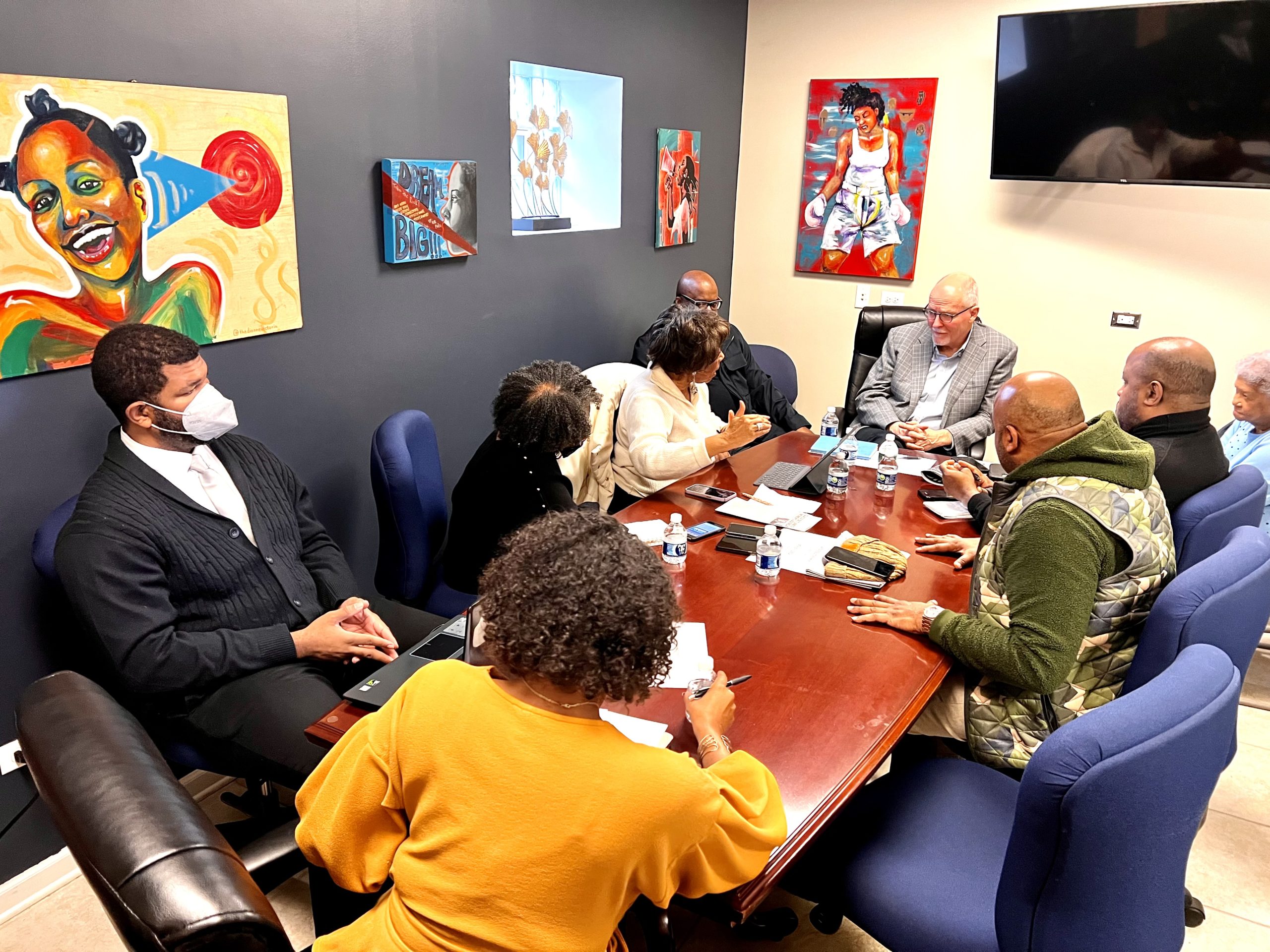Photo Credit : Amber Marie Green
Chicago mayoral candidate Paul Vallas fielded questions from legacy Black media outlets in a two-hour editorial roundtable on Thursday morning. Vallas, a former Chicago Public Schools CEO and mayoral candidate in 2019, is one of eight challengers vying to unseat incumbent Mayor Lori Lightfoot. Lightfoot is seeking a second term as mayor following her 2019 runoff victory over Cook County Board President Toni Preckiwinkle.
The Defender was joined by journalists from The Chicago Crusader, North Lawndale Community News, N’DIGO, among others for the sit-down conversation held at the Chicago News Weekly office located at 8348 S. Stony Island Ave. in the city’s Avalon Park neighborhood.

During the roundtable, Vallas responded to questions primarily concerning the Chicago Police Department’s budget and hiring of new officers, public safety, his business agenda for Black-owned businesses, and more.
(Interview questions and responses have been condensed for clarity and length.)
Q: You said you always answered the call for help, who called you in for help on this one?
VALLAS: Really, since the last election, I supported Lori and I tried to help her particularly when the teachers union struck. I tried to give her advice when COVID was approaching and it was clear the city needed to prepare financially. As I began to post and as I began to do op-ed pieces a number of people asked me to consider running again. I could put out some dramatic names, but I don’t want to put any aldermen in a tight spot.
Q: I believe community police should come from people in that community. Can you respond to that? Would you look at that?
VALLAS: There is no substitute for beat integrity and that includes cops covering local beats. There were 406,000 911 calls that were not responded to last year. Thirty-two thousand were high priority calls. You got to return to community based policing where you know the cops and their badge numbers. You need to establish that kind of personal relationship. What I propose in terms of expanding the ranks and diversifying the community is something I actually proposed four years ago. And we just use the ROTC programs and military academy programs, which I proposed. Those students are among the higher performing students, all the military academies, all seven of them in Chicago, never been on the watch list. Eighty-six percent of the kids are Black and Latino. Forty-six percent of the kids are young women. The bottom line is: you could create a pipeline so that the next generation of police officers and first responders and EMTs
and maybe bionics and and the next generation of nurses could actually come from those programs themselves.
Q: If you were elected, would you retain the current [Chicago Police Superintendent David Brown]?
VALLAS: Absolutely not. There are officers you all know that could step into the superintendent’s rank.
Q: Do you see the current superintendent as part of the problem?
VALLAS: Yeah, I do.

Q: I was curious to know your thoughts on defunding policing and using city funds for things in terms of housing, and other things that don’t involve policing whatsoever. Do you have any response to that?
VALLAS: I’ll respond by saying the mayor controls 20 billion dollars in spending. She controls the city, park district, schools, airports, etc. I just want to put it into perspective that when they say ‘oh, we’re spending forty percent of the fund on policing’ that’s a corporate fund, that’s a limited fund of the budget. So the point is, I don’t think you need to increase police funding. I think you need to fill the vacancies and if you fill the vacancies, the money you’ll save on overtime will probably costs. So you know, so I don’t think we need to put more money [in policing]. We need to allocate that money effectively.
Q: Would you decrease the amount that is currently being spent on policing and allocate that money into other spaces?
VALLAS: No, I wouldn’t decrease it.
Q: INVEST South/West: would you put more money into it?
(Note: According to the City of Chicago: “INVEST South/West is an unprecedented community improvement initiative by the City of Chicago that is strategically reversing decades of systemic public and private disinvestment within the city’s West and South Side neighborhoods.”)
VALLAS: First, I have no problem with INVEST South/West. INVEST South/West is two-thirds [former Chicago Mayor] Rahm Emanuel. What I am talking about is INVEST South/West on steroids. Three things: by having an entity independent of politics focusing exclusively on making an investment. Secondly, I’m talking about providing a permanent form of revenue – this is the community investment fund – every year whether it be casino money, or gaming, or video poker money which I would like to legalize and put in that fund, or put millions of dollars in TIF
surplus that the city could put in that fund so there could be a steady flow of capital that could be used to invest in a whole variety of things, social services, small businesses. The third thing would be land banking. We take this vacant property, idle property, and you activate it, and you turn it over to local community developers.
Q: Do you plan to reopen those six mental health clinics that Rahm Emanuel closed and Lori Lightfoot failed to reopen?
VALLAS: Yeah, well, what I said four years ago and I’d say today is every police district needs to have a mental health center. So at the end of the day, Rahm Emanuel made a lot of decisions that he claimed he needed to make to save money and he really didn’t. Mental health centers will pay for themselves if you’re billing properly Medicaid, Medicare insurance companies. There’s no reason why you can’t open a community based community operated and run mental health centers in each of the police districts.
Q: Would you prefer the mental health clinics be inside the police offices?
VALLAS: No, no, no. In the districts, not [inside] the [police] buildings.
Q: You mentioned on your website that you would bypass Cook County’s State’s Attorney Kim Foxx if you needed to. Could you elaborate on what you meant?
VALLAS: This is what I said on the website. I said, number one, you need to bring everybody together, you need to work with everybody. Number two is you need to be prepared and have the capacity to bypass if you think individuals are not being charged should be charged right now. Meaning you have to have a relationship with the US Attorney’s Office, and you have to have and you have to have the capacity to go directly to the judges themselves. There’s a lot of hate crimes, and there’s a lot of crimes like witnesses being threatened and intimidated. And individuals are not being charged.
Q: So, are you directing any of these comments directly to Kim Foxx herself?
VALLAS: Whoever the state’s attorney is, whether it’s Kim Foxx or what’s somebody who replaces Kim Foxx, that’s what I’m referring to.



